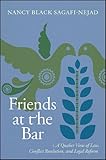A Quaker lawyer looks at Friends’ relationship with the American legal system and at Friends’ legal ethics.
George Fox, founder of the Religious Society of Friends, admonished his followers against “going to law.” In this fascinating, wide-ranging book, a Quaker lawyer explores the relationship between Quakers and the American legal system and discusses Friends’ legal ethics. A highly influential group in the US both for their spiritual ideals of harmony, equality and truth-telling and for their activism on many causes including abolition and opposition to war, Quakers have had many noteworthy interactions with the law. Nancy Black Sagafi-nejad sketches the history and beliefs of the early Quakers in England and America, then goes on to look at important twentieth century constitutional law cases involving Quakers, many involving civil rights issues. Sagafi-nejad’s survey of 100 Quaker lawyers shows them to be at odds with the adversarial system and highlights a legal practice which must balance truth-telling and zealous advocacy. The Quaker development of extra-legal dispute resolution to solve debates amongst Friends is discussed along with a look at the possible future of mediation.
“This book is a valuable testimonial to the legal work of Quakers … practicing lawyers who question the ethics of their profession and who read Sagafi-nejad’s book will be inspired to change the odds in favor of doing good.” — H-Net Reviews (H-Law)
“Friends at the Bar would make a valuable addition to the collections of academic law libraries, especially those with extensive holdings in the areas of religion and the law or legal reform … [it] is one of only a handful of monographs to address the Quakers’ relationship with the law.” — Law Library Journal
“Taken as a whole, Friends at the Bar contributes to the public discourse on legal reform, both as another call to expand alternatives to mainstream legal adversary practice and as a documentation of litigation’s historical value in promoting social justice. The alternative perspective on law offered here is refreshing.” — Law and Politics Book Review
Nancy Black Sagafi-nejad is an attorney. Recently retired, her main area of practice was civil law. She was in private practice and also worked on several civil rights projects for the states of Maryland and Texas.


